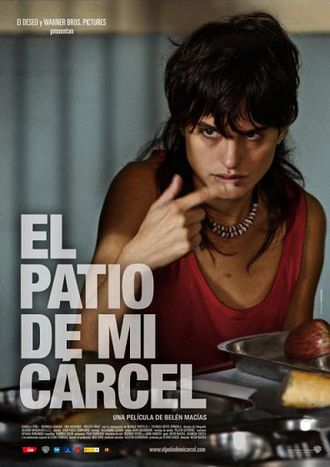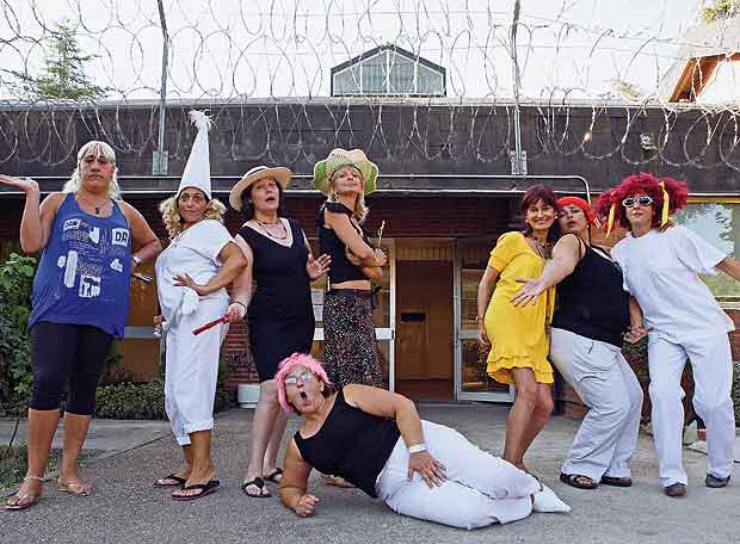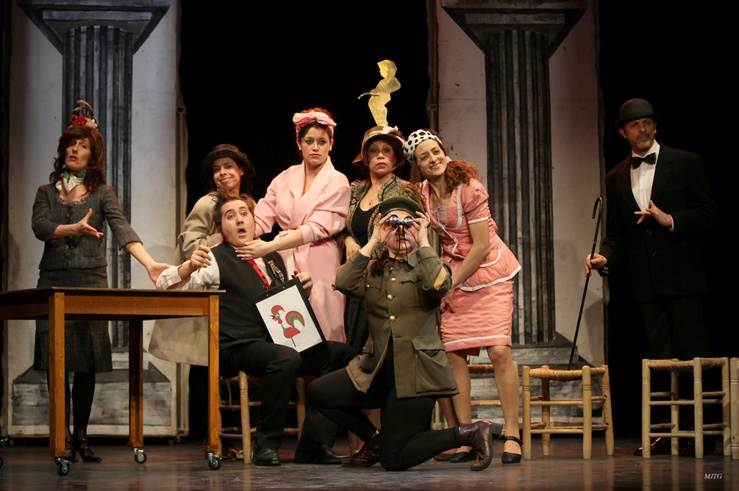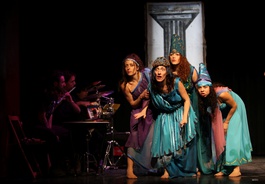
Madrid's Theatre Yeses troupe breaks prison bars
Published on
Translation by:
James FrisciaIts director is a prison officer with a degree in stage and performance management. Its actresses are inmates of the Alcalá de Henares penitentiary centre. The studio has allowed many to eventually begin new lives in the 'free world' and its story is depicted in a movie: everything about this artistic group is unique. Quick, the show is about to begin…
It is rehearsal time. The members of Theatre Yeses have a particular stage: the Alcalá de Henares penitentiary centre in Madrid. Its actresses are inmates. Its actors are 'free world professionals who collaborate with the group. The story’s prologue begins in 1985 when Elena Cánovas, its director and an officer in the former Yeserías prison, proposed forming a studio to the warden. 'Most of the girls were at their limit, with little hope or means. Yet while we may not have known it at the time, we were optimistic about the future. The new members should know that they are where they are now thanks to the first girls,' remarks Cánovas.

Today, the theatre group is still a studio in which one can find release. However, it is also an economic opportunity: the members are paid stipends thanks to the support provided of the general management of Madrid’s women of the community, which also organises a series of plays at cultural centres in the capital and its surroundings.
'Replacing drugs with theatre'
More than one thousand women have come through this cast in the last twenty-five years (many had small roles due to transfers or reduced sentences). Between ten and twelve are in the present group. 'Many find an escape from their marginalised world in which they would never be acknowledged in the applause,' explains Elena. 'They also learn that people on the outside work for a living, something they will also need to do. Above all, it’s a social activity. I have told many of them to replace drugs with theatre.'

The Yeses girls learn values such as teamwork, discipline, solidarity, tolerance and self-confidence. 'If you don’t have faith in yourself, you will not be able to work,' continues Elena. 'Believing is not only something beautiful, but it makes you employable. Sometimes, women enter with their morale on the ground and leave empowered. For them, it's primarily a way to find a place of freedom. The theatre allows them to forget about jail for a while. Not only do they learn to be actresses, but they also gain confidence in themselves and the means to make their lives worth as much as any other. Otherwise, many girls go their whole lives hearing that they are worthless.'
In a special plot twist, men were later admitted into the group. The first actors were inmates of Carabanchel, the men’s prison which neighbors Yeserías. Professional actors only arrived later. 'This group is just as good as others out there, and we could not always be putting beards on the girls.' In 1988 the troupe were selected by the general union of workers ('Unión General de Trabajadores') to participate in the second cultural works of the labour world. It was the first group outing to the 'free world'. The girls not only obtained their first re-acquaintance with the outside, but also the group’s first performance award and honourable mention.
'The police presence during the first group outing was tremendous'
'Everything was possible thanks to our progressive warden who understood that it could be done,' says Elena, though it was not exactly like an enchanting movie scene. 'The police presence (during the outing) was considerable. With undercover police as in presidential visit and the girls in cuffs, no-one was sure of the reaction the scene was going to generate. Some of the girls complained about the cuffs, arguing that this is not how actresses arrive at the theatre.'
Yeses: theatre to film, books and schools?
 The path has not been easy. The girls have needed to 'endure many rough patches' in Elena's words. For example, the group was temporarily paralysed after prison directors reacted angrily to a script written by the group, Mal Bajío ('Hard Knocks'), which exposes aspects of prison life. 'We endured many hard times, but it was necessary to continue fighting and not to lose momemtum.' Despite everything, the play won the Calderón de la Barca theatre award for best dramatic script, granted by the ministry of culture, and various grants which allowed the team to premiere the show in Madrid’s Galileo Galilei Hall.
The path has not been easy. The girls have needed to 'endure many rough patches' in Elena's words. For example, the group was temporarily paralysed after prison directors reacted angrily to a script written by the group, Mal Bajío ('Hard Knocks'), which exposes aspects of prison life. 'We endured many hard times, but it was necessary to continue fighting and not to lose momemtum.' Despite everything, the play won the Calderón de la Barca theatre award for best dramatic script, granted by the ministry of culture, and various grants which allowed the team to premiere the show in Madrid’s Galileo Galilei Hall.
Yeses' actresses even travelled as far as Berlin in 2000 (with methadone doses in the one of the women's luggage) for its first and until now only international outing. There, they participated in the international festival of theatre in prison in Berlin (Kantfestival Gefängnis und Theater), with a show in Spanish, including bits in English and German. In 2004, their script Libertas, libertatis was performed in Barcelona during the cultural forum. The fame of the Yeses group has only grown and in the last fifteen years, many famous national actors have taken part in its performances, including Loles León, Juan Luis Galiardo, Tristán Ulloa, Antonia San Juan and a young Santiago Segura, who in 1991 helped the girls learn about spontaneity. In 2008, the group made the jump to film. Director Belen Macias approached Elenas Cánovas with the intention of making a film inspired by the first years of Yeses. From this El patio de mi carcel ('My Prison Yard') was born. 'It was beautiful, but also a bit irritating because it makes it appear as if the group only exists due to the movie,' reflects Elena.
Next, will the group be immortalised in literature? 'A publisher has extended me a book offer,' says Elena. 'But what is really needed is to create a school on the outside. We definitely would need a project plan and assistance to make it work. It could be a studio famous for its theatre studies, but this is certainly a long-term vision. For now I will settle for whatever maintains the current group.' After a tour in Galicia in May - 'This is freedom,' says Elena. 'The girls say that the theatre is an island of freedom.'
Images: courtesy of the ©Yeses Group/ video: Youtube
Translated from Teatro Yeses rompe los barrotes de la prisión



